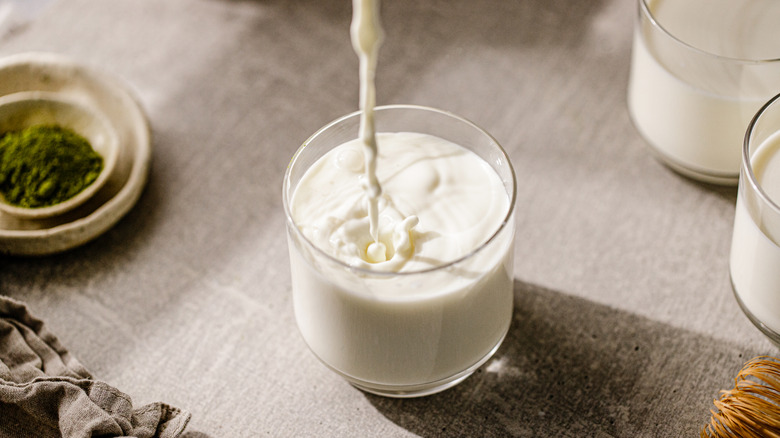Drink This Unique Type Of Milk For The Highest Amount Of Protein
Protein fits easily into many of your health goals. While you might already get plenty of protein in your diet if you eat meat, eating more protein can help you lose weight by reducing your appetite and helping you feel full for longer. Bodybuilders love protein to help build more muscle mass and stoke their metabolism. Protein also maintains strong bones, and a high protein diet might help you keep a healthy blood pressure (per Healthline).
Rather than eating more chicken or beef, you can turn to dairy as a good source of protein and other nutrients. A 2020 review in the Journal of Dairy Science found that dairy helps children grow taller and boosts iodine levels for women during childbearing years. The whey protein found in dairy can help older adults retain their muscles as they age. You can turn to cow's milk for your nutritional needs, but cup for cup, sheep's milk gives you almost twice the protein.
Nutrition comparison of sheep's milk
A cup of whole milk has 152 calories, 8 grams of protein, and 8 grams of fat, while a cup of sheep's milk has 265 calories, 15 grams of protein, and 17 grams of fat. Those extra 9 grams of fat in sheep's milk make it much more calorie-dense than cow's milk. Eleven of those fat grams come from saturated fat. You'll get about the same amount of potassium but slightly more calcium than cow's milk.
According to Sheep Milk Ireland, you'll also find more vitamins A, D, B2, and B12 in sheep's milk plus other minerals such as magnesium, selenium, and zinc. You'll also improve your gut's microbiome through the probiotics found in sheep's milk. Sheep's milk is also lactose-free for people who are sensitive or allergic to lactose. You'll find 18 amino acids in this milk. Sheep's milk also has conjugated linoleic acid (CLA), which is a fat that could reduce high blood pressure and body fat (per WebMD).
Health benefits of sheep's milk
Sheep's milk has bioactive substances to promote health, according to a 2021 article in the International Journal of Molecular Sciences. Sheep's milk has higher amounts of proline, which is an amino acid that helps with prenatal and postnatal development. Proline may protect against Alzheimer's disease and other conditions related to amyloid plaque formations in the brain. Animals injected with a proline-rich polypeptide had reversed brain degeneration.
The fats from sheep's milk can not only promote heart health by reducing cholesterol but also lower inflammation in the blood and liver. Sheep's milk also contains orotic acid, which is involved in the synthesis of DNA and RNA. When DNA repair processes don't work efficiently, it can lead to DNA damage, mutations, and potentially cancer. Orotic acid might play a role in regulating important genes to develop cells and tissues.
Dairy products made from sheep's milk might also improve health. The fermentation process used to make Greek cheese from sheep's milk enhances the blood-thinning properties, and yogurts with added omega-3 might reduce the risk of infectious diseases.



